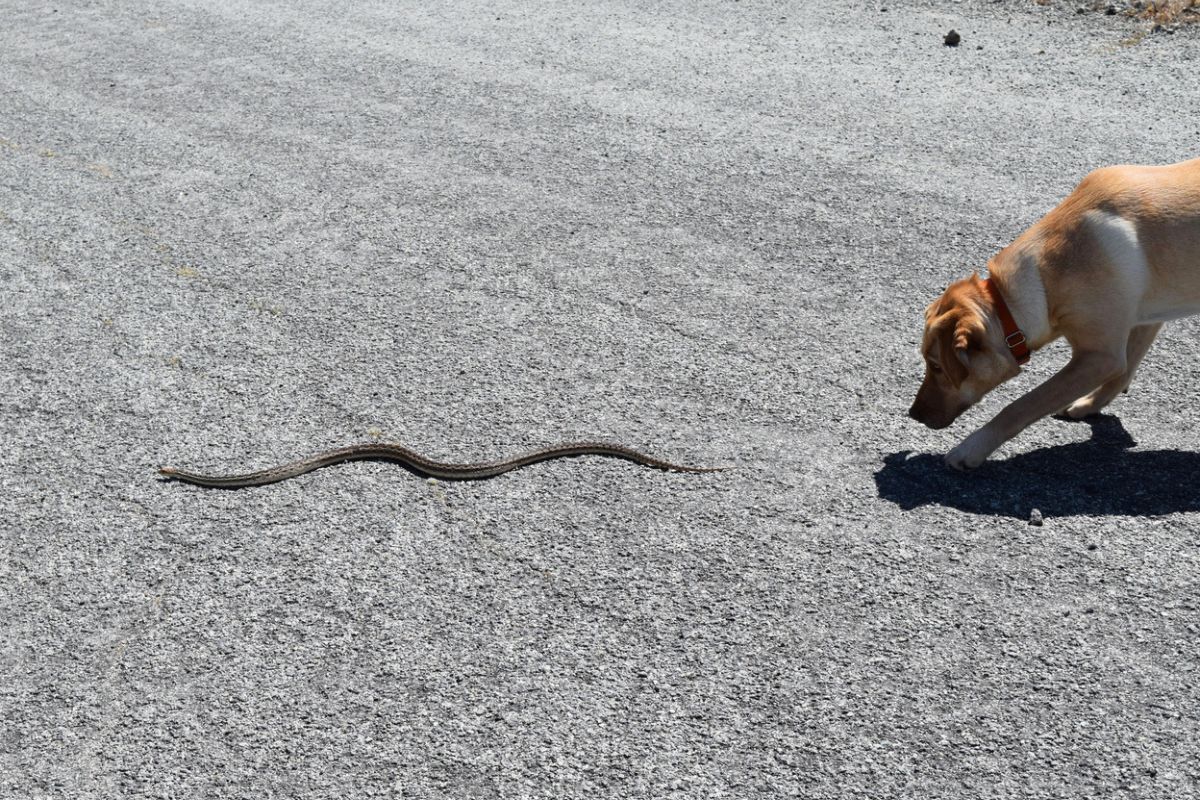With their natural curiosity and hunting instincts, it’s no surprise that our pets encounter snakes—especially during the warmer months when snakes are more active. Snake bites can be a serious threat to both dogs and cats, particularly if the snake is venomous. If your pet is bitten, it’s an emergency that needs immediate attention. Acting quickly can make all the difference in saving your furry friend’s life.
Signs of a snake bite
Signs of a snake bite usually appear 30 minutes to 24 hours after a bite, and dogs tend to display them faster than cats. Dogs are often bitten on the face or jaw while chasing snakes, while cats, being agile hunters, are usually bitten on the paws.
The signs of a bite can vary depending on the type of snake, the bite location and the amount of venom injected. Generally, the closer the bite is to the heart, the quicker the venom spreads to the rest of the body. Common signs can include;
- Sudden weakness or collapse – most commonly seen in dogs
- Rapid and shallow breathing
- Vomiting or loss of bowel control
- Shaking or twitching muscles
- Dilated pupils
- Blood in the urine
Cats usually show milder signs, often appearing weak with dilated pupils, which can progress to difficulty standing.
What to do immediately
If you suspect your pet has been bitten, time is of the essence. Venom spreads quickly, so get them to your vet as soon as possible. Here’s what to do on the way:
- Stay calm and keep them still
Slow down the venom’s spread by keeping your pet calm and limiting their movement. Apply a pressure bandages—just a firm bandage of any material over and around the bite site. Carry smaller pets, and for larger dogs, limit their movement.
- Don’t try to identify the snake
Attempting to catch or identify the snake could put you in danger. Individual species of snake can vary in colour and pattern considerably and are all but impossible to definitively identify other than by experienced snake handlers.
- Head to your vet ASAP
Call your vet or emergency clinic immediately to make sure they have antivenom on hand. Let them know you’re coming so they can be ready. Antivenom works best when given quickly, so don’t wait for symptoms to worsen.
- Avoid home remedies
Don’t try to suck out the venom, apply ice, or use a tourniquet. These methods can make things worse. The best thing you can do is take them to your vet as fast as you can.
How vets treat snake bites
At the clinic, the team will assess the bite and start treatment, which might include:
- Antivenom: This is crucial for venomous bites and works by neutralising the circulating venom. The type of antivenom given depends on the type of snake, however if the snake isn’t identified, your vet can make a decision based on your location and the presenting signs of a snake bite.
- Pain relief: To alleviate discomfort.
- IV fluids: To help stabilise blood pressure.
- Oxygen therapy: If your pet is having trouble breathing.
In severe cases, pets may need to stay at the clinic for further care. Recovery time varies depending on the snake and how quickly treatment begins. Cats may take longer to recover, as they often show milder signs of a snake bite, which can delay veterinary care.
Common venomous snakes in Australia
Australia is home to many venomous snakes, with brown snakes responsible for most bites and deaths in both animals and humans. The next most common venomous snakes in Australia are tiger snakes, found in the wetter parts of southern and eastern coastal Australia, especially near water. Other dangerous snakes to watch out for include black snakes and taipans.
Learn which snakes are common in your area so you can avoid them.
The deadly bite!
When a snake bites, it injects venom through its fangs into the tissue beneath the skin. This venom is quickly absorbed and spread through the animal’s lymphatic system, before later entering their bloodstream. Snake venom contains a variety of toxins that can cause severe tissue damage and disrupt vital functions, attacking the nervous system and interfering with the body’s ability to clot blood.
Important: If your pet is bitten, do not attempt to catch or kill the snake, Australian snakes are protected and you may expose yourself to unnecessary danger.
How to prevent snake bites
While snake bites can’t always be avoided, here are a few ways to reduce the risk:
- Sticking to well-marked trails when hiking and keeping your pet on a leash.
- Keeping your backyard tidy by mowing the grass short, and removing any wood piles, debris, building materials etc where snakes can hide.
- Investing in snake-proof fencing if necessary.
- Removing food scraps from outside that may attract rats (and therefore snakes).
- Being especially careful during warmer months when snakes are more active.
A snake bite is a serious situation, but with quick action and proper care, many pets make a full recovery. If you have any questions about snakes or snake bites, talk to your vet team.








